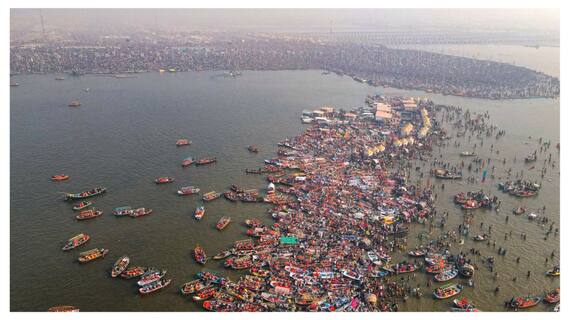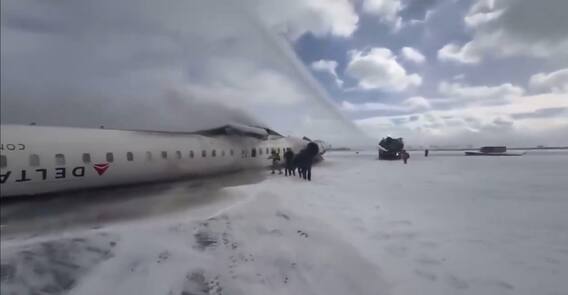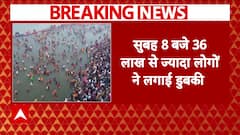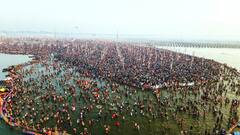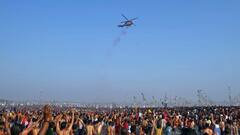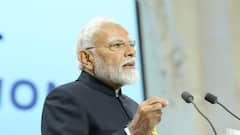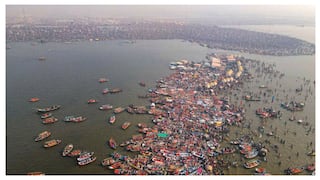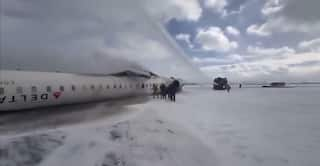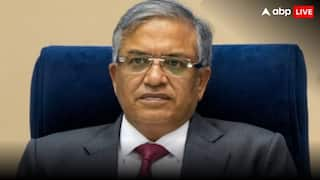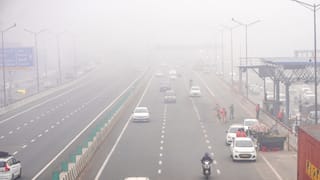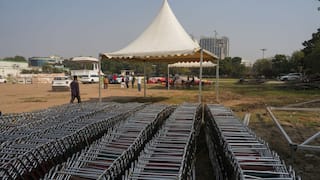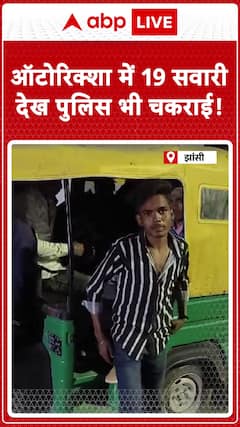Explorer
No plans to construct wall along Pakistan border: Govt tells Rajya Sabha

Indian Border Security Force (BSF) personnel patrol along a fence at the India-Pakistan border, at Wagah some 35kms from Amritsar. AFP PHOTO
NEW DELHI: India has no plans to construct a wall along its border with Pakistan, the Centre told Rajya Sabha on Wednesday.
"There was no proposal with the government of India to build a wall along the Pakistan border," Minister of State for Home Kiren Rijiju said replying a written question.
The Minister said the government has adopted a multi- pronged approach for security arrangements at the Indo-Pak border.
"The arrangements include deployment of BSF, construction of border fence, construction of border roads, installation of floodlights, construction of BOPs, introduction of hi-tech surveillance equipment, providing weapons and specialised vehicles to security forces," he said.
Can the entire 3,323 km long Indo-Pak border be sealed or how difficult is it construct a wall?
India shares 3,323 Km (including the Line of Control) of its land border with Pakistan. This border runs along the states of Gujarat, Rajasthan, Punjab and Jammu and Kashmir.
 Rajasthan:
Rajasthan shares 1037 km long border with Pakistan. The Indo-Pakistan border in 'The desert state of India' has varied terrain and distinct geographical features. Rajasthan desert is a greater part of the Thar Desert that is spread across the western part of India and the southeastern Pakistan.
If geographical structure of Rajasthan is considered then sealing the entire border this state shares with Pakistan seems difficult. Specially, the 233 km area of Barmer district which is on the edge of marshy lands of Rann of Kutch of Gujarat, where continuous exposure to highly saturated salt present in the air can even severely burn and damage the skin.
The entire state of Rajasthan becomes very hot during the summer. Specially, the Shahgarh bulge area of Jaiselmer District that experiences extreme climate. Temprature, in this part of land, driven largely by radiant heat, often reaches over 50°C. Constant winds tend to form more regularly shaped dunes or even long ridges. In such geographical complexities, fencing doesn't last long. The 32 km border this area shares with Pakistan couldn’t be fenced due to terrain.
"The condition of Shahgarh Bulge is unlike any other region in the state. Even the border fencing (read: markings) that is there gets covered up due to shifting sand dunes. However, sealing the border is not impossible. Complication will be there, no doubt. But we will have to find the solution." BL Chauhan, Former BSF DIG said.
Rajasthan:
Rajasthan shares 1037 km long border with Pakistan. The Indo-Pakistan border in 'The desert state of India' has varied terrain and distinct geographical features. Rajasthan desert is a greater part of the Thar Desert that is spread across the western part of India and the southeastern Pakistan.
If geographical structure of Rajasthan is considered then sealing the entire border this state shares with Pakistan seems difficult. Specially, the 233 km area of Barmer district which is on the edge of marshy lands of Rann of Kutch of Gujarat, where continuous exposure to highly saturated salt present in the air can even severely burn and damage the skin.
The entire state of Rajasthan becomes very hot during the summer. Specially, the Shahgarh bulge area of Jaiselmer District that experiences extreme climate. Temprature, in this part of land, driven largely by radiant heat, often reaches over 50°C. Constant winds tend to form more regularly shaped dunes or even long ridges. In such geographical complexities, fencing doesn't last long. The 32 km border this area shares with Pakistan couldn’t be fenced due to terrain.
"The condition of Shahgarh Bulge is unlike any other region in the state. Even the border fencing (read: markings) that is there gets covered up due to shifting sand dunes. However, sealing the border is not impossible. Complication will be there, no doubt. But we will have to find the solution." BL Chauhan, Former BSF DIG said.
 Gujarat:
This western Indian state shares 508 km long International Border with Pakistan. However, only 262 km border could be fenced due to geographical complexities. Here, The Rann of Kutch, uninhabited area of salt marshy land and nothingness separates India from Pakistan. The area consists of marshy lands which can not be fenced.
"If we talk about The Rann of Kutch that covers around 340 km of the International Border, 64 km patch could not be fenced because of its terrain. The land is marshy and wet," said Nikhil Pandya, expert on Kutch.
Topography, geology and harsh climatic conditions make construction and maintenance of roads and fencing extremely difficult. The area gets submerged in water and is prone to sinking, and there is a high concentration of salt in water. The construction and maintenance in such harsh and tough terrain is challenging. This is the reason Indo-Pak border in Kutch is open.
Gujarat:
This western Indian state shares 508 km long International Border with Pakistan. However, only 262 km border could be fenced due to geographical complexities. Here, The Rann of Kutch, uninhabited area of salt marshy land and nothingness separates India from Pakistan. The area consists of marshy lands which can not be fenced.
"If we talk about The Rann of Kutch that covers around 340 km of the International Border, 64 km patch could not be fenced because of its terrain. The land is marshy and wet," said Nikhil Pandya, expert on Kutch.
Topography, geology and harsh climatic conditions make construction and maintenance of roads and fencing extremely difficult. The area gets submerged in water and is prone to sinking, and there is a high concentration of salt in water. The construction and maintenance in such harsh and tough terrain is challenging. This is the reason Indo-Pak border in Kutch is open.
 Government has introduced a vehicle, All Terrain Vehicle, which can float over the water and run on land both ways. BSF protects creeks and marshy border area of Kutch with the help of this unique vehicle, ATV.
Soldiers, protecting border, are given specialised training to walk in the highly salty and swampy Rann of Kutch.
"Other vehicles are not successful here except for ATP. It is through this vehicle we dominate and protect this area, JP Dutta, company commander BSF, said.
Indo-Pak's undisputed International Border starts from Jammu's pillar number 1 and ends with Kutch's pillar number 1175.
Government has introduced a vehicle, All Terrain Vehicle, which can float over the water and run on land both ways. BSF protects creeks and marshy border area of Kutch with the help of this unique vehicle, ATV.
Soldiers, protecting border, are given specialised training to walk in the highly salty and swampy Rann of Kutch.
"Other vehicles are not successful here except for ATP. It is through this vehicle we dominate and protect this area, JP Dutta, company commander BSF, said.
Indo-Pak's undisputed International Border starts from Jammu's pillar number 1 and ends with Kutch's pillar number 1175.
 Jammu and Kashmir
Jammu and Kashmir shares 1225 km long Border with Pakistan, which includes 740 km LoC. Jammu region has 200 km International Border that demarcates India and Pakistan. There are many riverine tracts, mountainous areas, rivers which can make it difficult to completely seal the border.
"The problem that I see is of river bodies. There are seven-eight rivers that directly flow into Pakistan from India. The discharge of Chenab during winter is 4,500 cusecs, but it even touches 600,000 cusecs. The height from the bed level raises to 50 feet and it carries huge amount waste. The flow discharge also remains at peak. It occurs during winters and rainy seasons almost once or twice a weak." said AS Wazir, retired chief engineer, Jammu.
LeT and other terrorist organisations have been infiltrating militants into India through these small water bodies and rivers that flow from Indian and straight into Pakistan. Constructing a wall to seal the broader on these water bodies seems difficult.
Ujh River, Faag Naala, Basera Naala, Sanp Nala, Tarnah Naala, Ben Naala, Babbar Naala, Basantar river, Devok river, Ek naala and Dasmaala Naala are the major infiltration points used by terrorists to sneek into India.
According to defence experts, to check cross-border infiltration from these points thermal and laser wall mechanism can be used.
"Laser wall is a mechanism to detect objects passing the line of sight between the laser source and the detector. A laser beam over a river sets off a loud siren in case of a breach," said Brigadier (Retd) Anil Gupta.
Jammu and Kashmir
Jammu and Kashmir shares 1225 km long Border with Pakistan, which includes 740 km LoC. Jammu region has 200 km International Border that demarcates India and Pakistan. There are many riverine tracts, mountainous areas, rivers which can make it difficult to completely seal the border.
"The problem that I see is of river bodies. There are seven-eight rivers that directly flow into Pakistan from India. The discharge of Chenab during winter is 4,500 cusecs, but it even touches 600,000 cusecs. The height from the bed level raises to 50 feet and it carries huge amount waste. The flow discharge also remains at peak. It occurs during winters and rainy seasons almost once or twice a weak." said AS Wazir, retired chief engineer, Jammu.
LeT and other terrorist organisations have been infiltrating militants into India through these small water bodies and rivers that flow from Indian and straight into Pakistan. Constructing a wall to seal the broader on these water bodies seems difficult.
Ujh River, Faag Naala, Basera Naala, Sanp Nala, Tarnah Naala, Ben Naala, Babbar Naala, Basantar river, Devok river, Ek naala and Dasmaala Naala are the major infiltration points used by terrorists to sneek into India.
According to defence experts, to check cross-border infiltration from these points thermal and laser wall mechanism can be used.
"Laser wall is a mechanism to detect objects passing the line of sight between the laser source and the detector. A laser beam over a river sets off a loud siren in case of a breach," said Brigadier (Retd) Anil Gupta.
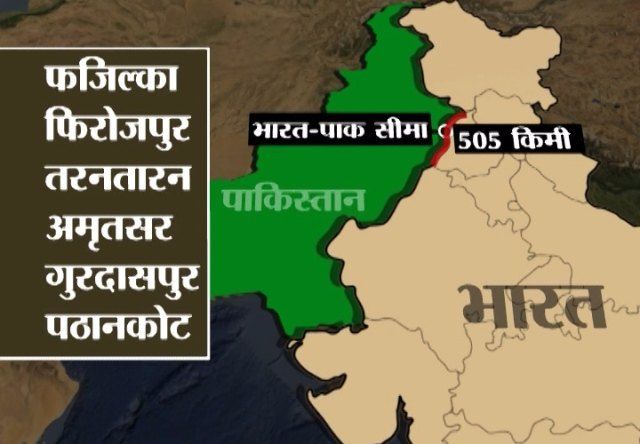 Punjab
This northwestern Indian state shares around 505 km long border with Pakistan. Six districts of Punjab- Fazilka, Firozepur, Tarn Taran, Gurdaspur and Pathankot are situated along the border. Here, the border is divided into parts- Fazilka to Firozepur, Tarn Taran to Amritsar's Attari sector and Gurdaspur to Pathankot.
During the Pathankot attack, the terrorists had used one of the riverine tract located Girdaspur-Pathankot border to enter the Indian territory.
The riverine neighborhood of Punjab and the vicinity of river Ravi and its tributaries along the border make cross-border infiltration easier. The limitations imposed by these geographical conditions also pose challenges for the BSF in guarding the border.
"Riverine tracts can be fenced but constructing a wall in these areas will be difficult," said Brigadier Harwant Singh, defence expert.
(With inputs from PTI)
Punjab
This northwestern Indian state shares around 505 km long border with Pakistan. Six districts of Punjab- Fazilka, Firozepur, Tarn Taran, Gurdaspur and Pathankot are situated along the border. Here, the border is divided into parts- Fazilka to Firozepur, Tarn Taran to Amritsar's Attari sector and Gurdaspur to Pathankot.
During the Pathankot attack, the terrorists had used one of the riverine tract located Girdaspur-Pathankot border to enter the Indian territory.
The riverine neighborhood of Punjab and the vicinity of river Ravi and its tributaries along the border make cross-border infiltration easier. The limitations imposed by these geographical conditions also pose challenges for the BSF in guarding the border.
"Riverine tracts can be fenced but constructing a wall in these areas will be difficult," said Brigadier Harwant Singh, defence expert.
(With inputs from PTI)
 Rajasthan:
Rajasthan shares 1037 km long border with Pakistan. The Indo-Pakistan border in 'The desert state of India' has varied terrain and distinct geographical features. Rajasthan desert is a greater part of the Thar Desert that is spread across the western part of India and the southeastern Pakistan.
If geographical structure of Rajasthan is considered then sealing the entire border this state shares with Pakistan seems difficult. Specially, the 233 km area of Barmer district which is on the edge of marshy lands of Rann of Kutch of Gujarat, where continuous exposure to highly saturated salt present in the air can even severely burn and damage the skin.
The entire state of Rajasthan becomes very hot during the summer. Specially, the Shahgarh bulge area of Jaiselmer District that experiences extreme climate. Temprature, in this part of land, driven largely by radiant heat, often reaches over 50°C. Constant winds tend to form more regularly shaped dunes or even long ridges. In such geographical complexities, fencing doesn't last long. The 32 km border this area shares with Pakistan couldn’t be fenced due to terrain.
"The condition of Shahgarh Bulge is unlike any other region in the state. Even the border fencing (read: markings) that is there gets covered up due to shifting sand dunes. However, sealing the border is not impossible. Complication will be there, no doubt. But we will have to find the solution." BL Chauhan, Former BSF DIG said.
Rajasthan:
Rajasthan shares 1037 km long border with Pakistan. The Indo-Pakistan border in 'The desert state of India' has varied terrain and distinct geographical features. Rajasthan desert is a greater part of the Thar Desert that is spread across the western part of India and the southeastern Pakistan.
If geographical structure of Rajasthan is considered then sealing the entire border this state shares with Pakistan seems difficult. Specially, the 233 km area of Barmer district which is on the edge of marshy lands of Rann of Kutch of Gujarat, where continuous exposure to highly saturated salt present in the air can even severely burn and damage the skin.
The entire state of Rajasthan becomes very hot during the summer. Specially, the Shahgarh bulge area of Jaiselmer District that experiences extreme climate. Temprature, in this part of land, driven largely by radiant heat, often reaches over 50°C. Constant winds tend to form more regularly shaped dunes or even long ridges. In such geographical complexities, fencing doesn't last long. The 32 km border this area shares with Pakistan couldn’t be fenced due to terrain.
"The condition of Shahgarh Bulge is unlike any other region in the state. Even the border fencing (read: markings) that is there gets covered up due to shifting sand dunes. However, sealing the border is not impossible. Complication will be there, no doubt. But we will have to find the solution." BL Chauhan, Former BSF DIG said.
 Gujarat:
This western Indian state shares 508 km long International Border with Pakistan. However, only 262 km border could be fenced due to geographical complexities. Here, The Rann of Kutch, uninhabited area of salt marshy land and nothingness separates India from Pakistan. The area consists of marshy lands which can not be fenced.
"If we talk about The Rann of Kutch that covers around 340 km of the International Border, 64 km patch could not be fenced because of its terrain. The land is marshy and wet," said Nikhil Pandya, expert on Kutch.
Topography, geology and harsh climatic conditions make construction and maintenance of roads and fencing extremely difficult. The area gets submerged in water and is prone to sinking, and there is a high concentration of salt in water. The construction and maintenance in such harsh and tough terrain is challenging. This is the reason Indo-Pak border in Kutch is open.
Gujarat:
This western Indian state shares 508 km long International Border with Pakistan. However, only 262 km border could be fenced due to geographical complexities. Here, The Rann of Kutch, uninhabited area of salt marshy land and nothingness separates India from Pakistan. The area consists of marshy lands which can not be fenced.
"If we talk about The Rann of Kutch that covers around 340 km of the International Border, 64 km patch could not be fenced because of its terrain. The land is marshy and wet," said Nikhil Pandya, expert on Kutch.
Topography, geology and harsh climatic conditions make construction and maintenance of roads and fencing extremely difficult. The area gets submerged in water and is prone to sinking, and there is a high concentration of salt in water. The construction and maintenance in such harsh and tough terrain is challenging. This is the reason Indo-Pak border in Kutch is open.
 Government has introduced a vehicle, All Terrain Vehicle, which can float over the water and run on land both ways. BSF protects creeks and marshy border area of Kutch with the help of this unique vehicle, ATV.
Soldiers, protecting border, are given specialised training to walk in the highly salty and swampy Rann of Kutch.
"Other vehicles are not successful here except for ATP. It is through this vehicle we dominate and protect this area, JP Dutta, company commander BSF, said.
Indo-Pak's undisputed International Border starts from Jammu's pillar number 1 and ends with Kutch's pillar number 1175.
Government has introduced a vehicle, All Terrain Vehicle, which can float over the water and run on land both ways. BSF protects creeks and marshy border area of Kutch with the help of this unique vehicle, ATV.
Soldiers, protecting border, are given specialised training to walk in the highly salty and swampy Rann of Kutch.
"Other vehicles are not successful here except for ATP. It is through this vehicle we dominate and protect this area, JP Dutta, company commander BSF, said.
Indo-Pak's undisputed International Border starts from Jammu's pillar number 1 and ends with Kutch's pillar number 1175.
 Jammu and Kashmir
Jammu and Kashmir shares 1225 km long Border with Pakistan, which includes 740 km LoC. Jammu region has 200 km International Border that demarcates India and Pakistan. There are many riverine tracts, mountainous areas, rivers which can make it difficult to completely seal the border.
"The problem that I see is of river bodies. There are seven-eight rivers that directly flow into Pakistan from India. The discharge of Chenab during winter is 4,500 cusecs, but it even touches 600,000 cusecs. The height from the bed level raises to 50 feet and it carries huge amount waste. The flow discharge also remains at peak. It occurs during winters and rainy seasons almost once or twice a weak." said AS Wazir, retired chief engineer, Jammu.
LeT and other terrorist organisations have been infiltrating militants into India through these small water bodies and rivers that flow from Indian and straight into Pakistan. Constructing a wall to seal the broader on these water bodies seems difficult.
Ujh River, Faag Naala, Basera Naala, Sanp Nala, Tarnah Naala, Ben Naala, Babbar Naala, Basantar river, Devok river, Ek naala and Dasmaala Naala are the major infiltration points used by terrorists to sneek into India.
According to defence experts, to check cross-border infiltration from these points thermal and laser wall mechanism can be used.
"Laser wall is a mechanism to detect objects passing the line of sight between the laser source and the detector. A laser beam over a river sets off a loud siren in case of a breach," said Brigadier (Retd) Anil Gupta.
Jammu and Kashmir
Jammu and Kashmir shares 1225 km long Border with Pakistan, which includes 740 km LoC. Jammu region has 200 km International Border that demarcates India and Pakistan. There are many riverine tracts, mountainous areas, rivers which can make it difficult to completely seal the border.
"The problem that I see is of river bodies. There are seven-eight rivers that directly flow into Pakistan from India. The discharge of Chenab during winter is 4,500 cusecs, but it even touches 600,000 cusecs. The height from the bed level raises to 50 feet and it carries huge amount waste. The flow discharge also remains at peak. It occurs during winters and rainy seasons almost once or twice a weak." said AS Wazir, retired chief engineer, Jammu.
LeT and other terrorist organisations have been infiltrating militants into India through these small water bodies and rivers that flow from Indian and straight into Pakistan. Constructing a wall to seal the broader on these water bodies seems difficult.
Ujh River, Faag Naala, Basera Naala, Sanp Nala, Tarnah Naala, Ben Naala, Babbar Naala, Basantar river, Devok river, Ek naala and Dasmaala Naala are the major infiltration points used by terrorists to sneek into India.
According to defence experts, to check cross-border infiltration from these points thermal and laser wall mechanism can be used.
"Laser wall is a mechanism to detect objects passing the line of sight between the laser source and the detector. A laser beam over a river sets off a loud siren in case of a breach," said Brigadier (Retd) Anil Gupta.
 Punjab
This northwestern Indian state shares around 505 km long border with Pakistan. Six districts of Punjab- Fazilka, Firozepur, Tarn Taran, Gurdaspur and Pathankot are situated along the border. Here, the border is divided into parts- Fazilka to Firozepur, Tarn Taran to Amritsar's Attari sector and Gurdaspur to Pathankot.
During the Pathankot attack, the terrorists had used one of the riverine tract located Girdaspur-Pathankot border to enter the Indian territory.
The riverine neighborhood of Punjab and the vicinity of river Ravi and its tributaries along the border make cross-border infiltration easier. The limitations imposed by these geographical conditions also pose challenges for the BSF in guarding the border.
"Riverine tracts can be fenced but constructing a wall in these areas will be difficult," said Brigadier Harwant Singh, defence expert.
(With inputs from PTI)
Punjab
This northwestern Indian state shares around 505 km long border with Pakistan. Six districts of Punjab- Fazilka, Firozepur, Tarn Taran, Gurdaspur and Pathankot are situated along the border. Here, the border is divided into parts- Fazilka to Firozepur, Tarn Taran to Amritsar's Attari sector and Gurdaspur to Pathankot.
During the Pathankot attack, the terrorists had used one of the riverine tract located Girdaspur-Pathankot border to enter the Indian territory.
The riverine neighborhood of Punjab and the vicinity of river Ravi and its tributaries along the border make cross-border infiltration easier. The limitations imposed by these geographical conditions also pose challenges for the BSF in guarding the border.
"Riverine tracts can be fenced but constructing a wall in these areas will be difficult," said Brigadier Harwant Singh, defence expert.
(With inputs from PTI)
Follow Breaking News on ABP Live for more latest stories and trending topics. Watch breaking news and top headlines online on ABP News LIVE TV
View More
Advertisement

Don't Miss Out
00
Hours
00
Minutes
00
Seconds
Trending News
Advertisement
Advertisement
Top Headlines
World
Cities
World
Education
Advertisement


Prosenjit NathThe writer is a technocrat, political analyst, and author.
Opinion









